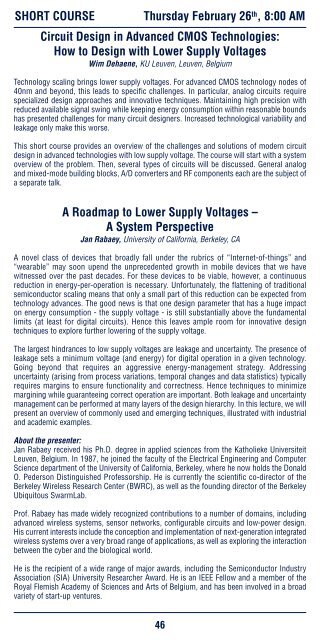ISSCC2015AdvanceProgram
ISSCC2015AdvanceProgram
ISSCC2015AdvanceProgram
Create successful ePaper yourself
Turn your PDF publications into a flip-book with our unique Google optimized e-Paper software.
SHORT COURSEThursday February 26 th , 8:00 AMCircuit Design in Advanced CMOS Technologies:How to Design with Lower Supply VoltagesWim Dehaene, KU Leuven, Leuven, BelgiumTechnology scaling brings lower supply voltages. For advanced CMOS technology nodes of40nm and beyond, this leads to specific challenges. In particular, analog circuits requirespecialized design approaches and innovative techniques. Maintaining high precision withreduced available signal swing while keeping energy consumption within reasonable boundshas presented challenges for many circuit designers. Increased technological variability andleakage only make this worse.This short course provides an overview of the challenges and solutions of modern circuitdesign in advanced technologies with low supply voltage. The course will start with a systemoverview of the problem. Then, several types of circuits will be discussed. General analogand mixed-mode building blocks, A/D converters and RF components each are the subject ofa separate talk.A Roadmap to Lower Supply Voltages –A System PerspectiveJan Rabaey, University of California, Berkeley, CAA novel class of devices that broadly fall under the rubrics of “Internet-of-things” and“wearable” may soon upend the unprecedented growth in mobile devices that we havewitnessed over the past decades. For these devices to be viable, however, a continuousreduction in energy-per-operation is necessary. Unfortunately, the flattening of traditionalsemiconductor scaling means that only a small part of this reduction can be expected fromtechnology advances. The good news is that one design parameter that has a huge impacton energy consumption - the supply voltage - is still substantially above the fundamentallimits (at least for digital circuits). Hence this leaves ample room for innovative designtechniques to explore further lowering of the supply voltage.The largest hindrances to low supply voltages are leakage and uncertainty. The presence ofleakage sets a minimum voltage (and energy) for digital operation in a given technology.Going beyond that requires an aggressive energy-management strategy. Addressinguncertainty (arising from process variations, temporal changes and data statistics) typicallyrequires margins to ensure functionality and correctness. Hence techniques to minimizemargining while guaranteeing correct operation are important. Both leakage and uncertaintymanagement can be performed at many layers of the design hierarchy. In this lecture, we willpresent an overview of commonly used and emerging techniques, illustrated with industrialand academic examples.About the presenter:Jan Rabaey received his Ph.D. degree in applied sciences from the Katholieke UniversiteitLeuven, Belgium. In 1987, he joined the faculty of the Electrical Engineering and ComputerScience department of the University of California, Berkeley, where he now holds the DonaldO. Pederson Distinguished Professorship. He is currently the scientific co-director of theBerkeley Wireless Research Center (BWRC), as well as the founding director of the BerkeleyUbiquitous SwarmLab.Prof. Rabaey has made widely recognized contributions to a number of domains, includingadvanced wireless systems, sensor networks, configurable circuits and low-power design.His current interests include the conception and implementation of next-generation integratedwireless systems over a very broad range of applications, as well as exploring the interactionbetween the cyber and the biological world.He is the recipient of a wide range of major awards, including the Semiconductor IndustryAssociation (SIA) University Researcher Award. He is an IEEE Fellow and a member of theRoyal Flemish Academy of Sciences and Arts of Belgium, and has been involved in a broadvariety of start-up ventures.46


